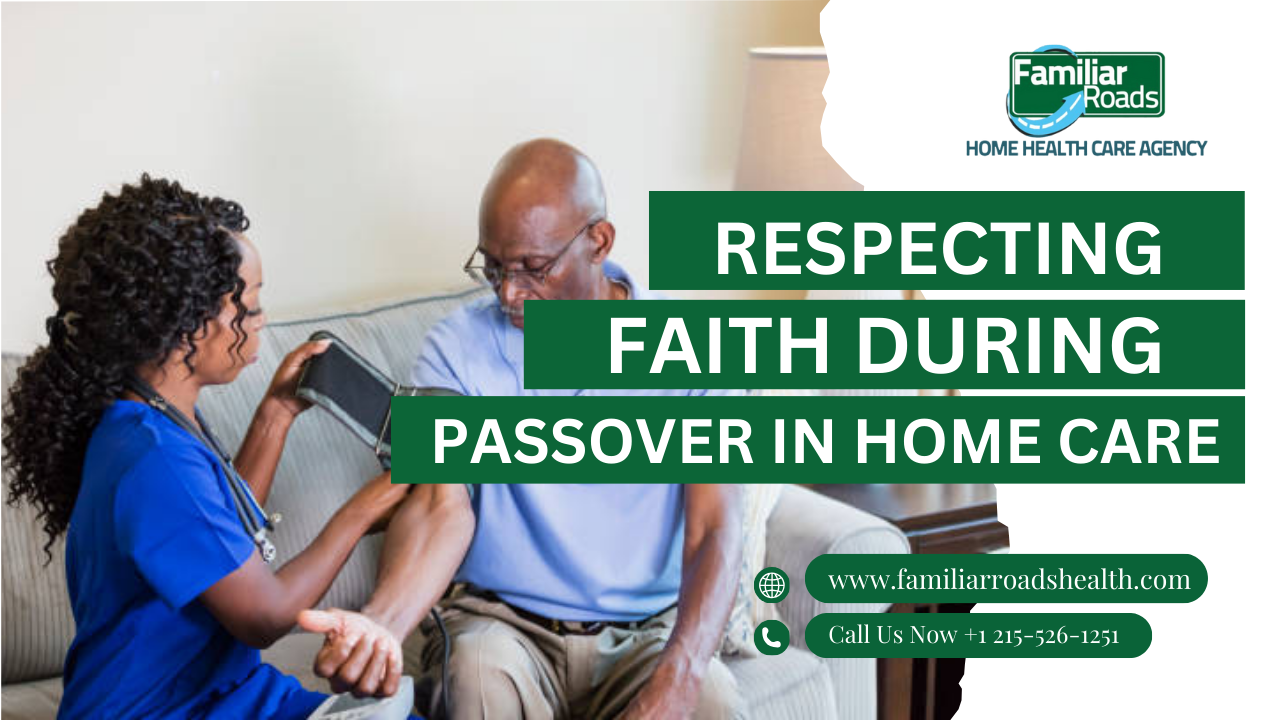Passover, or Pesach, is one of the most significant Jewish holidays, commemorating the Israelites’ liberation from slavery in Egypt. For Jewish families, this time is rich with spiritual reflection, dietary customs, and ritual observances. In the context of home care, respecting faith during Passover in home care is crucial—caregivers must understand and honor these traditions to provide truly compassionate and culturally sensitive support.
Respecting faith during Passover goes beyond avoiding certain foods. It involves honoring rituals, maintaining spiritual integrity, and adapting care routines in ways that align with the client’s religious beliefs. This blog post explores how caregivers can support their Jewish clients during Passover while promoting dignity, inclusion, and respect.

Passover is observed for eight days (seven in Israel) and begins with a special meal called the Seder. The Seder includes symbolic foods, readings from the Haggadah, and a retelling of the Exodus story. Throughout the holiday, observant Jews refrain from eating chametz (leavened products) and often go through an extensive process of cleaning their homes to remove all traces of it.
As a caregiver, being aware of the spiritual and emotional significance of Passover is essential for building trust and providing respectful care.
During Passover, many Jews follow strict dietary laws that exclude leavened grains (wheat, barley, rye, oats, and spelt) and foods that may be contaminated with them. Instead, they consume specially prepared kosher-for-Passover foods.
Caregiver Tips:
Communicate with the client or family members about specific dietary requirements.
Avoid bringing chametz into the home during the holiday.
Use separate utensils and cookware designated for Passover, if requested.
Read food labels carefully or consult kosher certification symbols.
Providing meals that align with religious guidelines is not only a practical need but also a sign of deep cultural respect.
For many Jewish individuals, attending or hosting a Seder is the highlight of the Passover celebration. The rituals may vary by denomination and family tradition, but they are universally meaningful.
Caregiver Tips:
Help clients prepare for the Seder by assisting with shopping, cooking, or setting up the table.
Be mindful of the timing and structure of the Seder, which may take place in the evening and last several hours.
Offer assistance in accessing religious texts like the Haggadah or audio/visual materials for virtual Seders.
Encourage family involvement and facilitate communication if loved ones live far away.
Showing interest and willingness to support religious observances can create a stronger, more trusting caregiver-client relationship.
In preparation for Passover, many Jewish families clean their homes meticulously to remove all chametz. Some may even avoid using areas or items that haven’t been certified as chametz-free.
Caregiver Tips:
Offer to help with the pre-Passover cleaning under the client’s direction.
Use designated cleaning products or tools, if available.
Avoid placing food or drink in areas that have been cleaned or covered for Passover.
The goal is to create an environment that feels spiritually appropriate and clean in accordance with tradition.

Some Jewish individuals refrain from work or certain activities during the first two and last two days of Passover. These days are considered full holidays, while the middle days (Chol Hamoed) may allow for more leniency.
Caregiver Tips:
Ask your client or their family how strictly they observe the holiday.
Avoid scheduling medical appointments or outings on holy days, unless necessary.
Refrain from using electricity or writing on these days, if requested by the client.
Flexibility in care routines is vital to honoring religious commitments without disrupting necessary health support.
Passover can be a joyful but also emotional time, especially for aging adults who may no longer celebrate as they once did. Some may feel isolated or miss family traditions.
Caregiver Tips:
Engage clients in reminiscing about past Passovers.
Play traditional music or recite prayers together if appropriate.
Encourage storytelling, which is central to the Seder tradition.
Coordinate with local synagogues or community centers that may offer remote services or outreach programs.
Compassionate care during the holidays means recognizing and responding to the emotional and spiritual needs that arise.
Family members and religious leaders are valuable allies in providing respectful Passover care. Caregivers can work alongside them to ensure all cultural and religious expectations are met.
Caregiver Tips:
Communicate openly with family about Passover routines and preferences.
Encourage family participation in religious rituals when possible.
Consider contacting a local rabbi for guidance on specific practices if you’re unsure.
Respect begins with understanding, and open communication is the key to delivering meaningful care.
Respecting faith during Passover in home care is about more than following a checklist—it’s about honoring identity, tradition, and dignity. For Jewish clients, Passover represents a powerful connection to faith, family, and heritage. By learning about and supporting their observances, caregivers can create a space of comfort, trust, and respect.
Whether it’s helping prepare kosher meals, supporting Seder traditions, or simply listening to stories from past celebrations, small acts of cultural sensitivity can have a profound impact. As a caregiver, your role during Passover is not just to assist with daily tasks but to help clients feel seen, valued, and spiritually supported during this important time.
Need help navigating your Respecting Faith During Passover in Home Care? Contact Familiar Roads Home Healthcare today!
Call: 215-526-1251
Email: info@familiarroadshealth.com
Website: www.familiarroadshealth.com
Copyright © 2025 Familiar Roads Home Health Care Agency, All rights reserved
Made By Digi Grows LLC